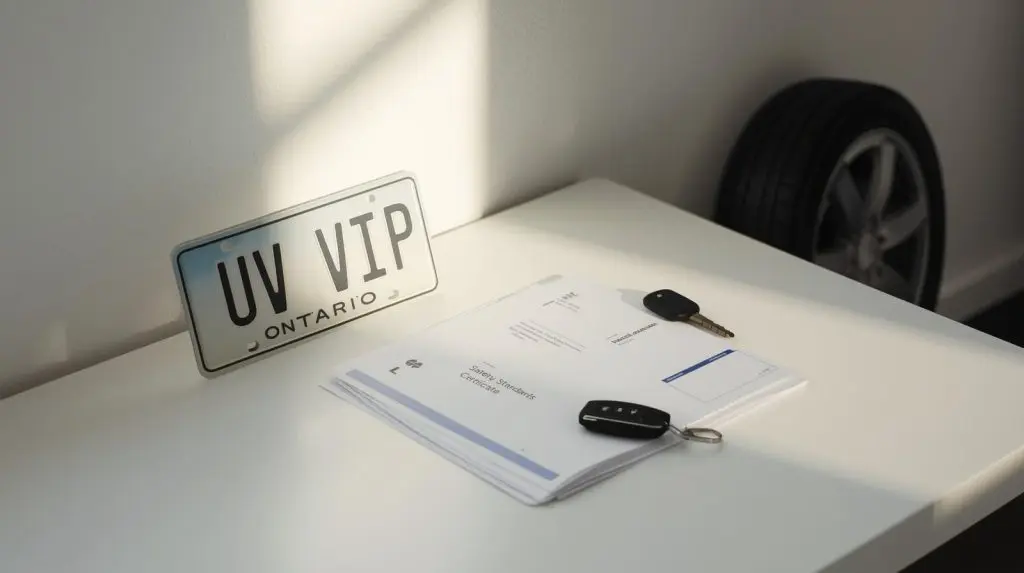Buying your first car feels big—exciting, but a little confusing. This step-by-step checklist keeps it simple: what to check before you pay, what paperwork Ontario actually requires, and the key differences between buying from a dealer and a private seller. You’ll also see what new drivers typically pay for insurance and how to budget for tax and registration.

Buying Your First Car in Ontario: Quick checklist
- Set a budget (car price + 13% RST if private sale + registration + first-month insurance). RST on private purchases is paid at ServiceOntario.
- Run insurance quotes before you pick a car (rates vary by car, postal code, driving record). FSRA publishes the provincial average to benchmark.
- See the car in daylight; test drive; check all lights, brakes, windows, HVAC, tires, warning lights.
- Ask for the UVIP if it’s a private sale (mandatory for seller to provide). Confirm the VIN matches the car.
- Do a pre-purchase inspection with a trusted mechanic.
- Confirm lien status (UVIP lists liens; do extra PPSA/CARFAX checks if anything looks off).
- Agree on price in writing (bill of sale section in the UVIP for private sales).
- Plan the Safety Standards Certificate (SSC) if required for registration/transfer. It’s valid 36 days.
- Register and plate at ServiceOntario (bring insurance proof, ID, signed UVIP/bill of sale; pay RST on private sales).
Read: How to get an Ontario Health Card (OHIP)
UVIP (Used Vehicle Information Package) — what it is, who provides it, cost
What it is: The UVIP shows a vehicle’s Ontario history and key facts to help you avoid surprises. It typically includes vehicle details, Ontario registration history, lien information, and the bill-of-sale/transfer section.
Who provides it: In a private sale, the seller must buy and give the UVIP to the buyer. You don’t need a UVIP if you’re buying from an OMVIC-registered dealer or transferring between eligible family members.
Price: The UVIP fee is $20 by regulation.
Tip: Bring the UVIP to your mechanic’s inspection and verify the VIN on the UVIP, dashboard, and door jamb all match.
Read: Working While Studying: Hours, SIN, Taxes, and Co‑op Rules
Safety Standards Certificate (SSC) — when you need it
Ontario requires an SSC in these common cases: transferring a used vehicle to a new owner (unless spouse), registering a rebuilt or out-of-province vehicle, or changing “unfit” to “fit.” An SSC is not a warranty; it just confirms the vehicle met minimum safety standards on the inspection date. Certificates are valid 36 days.
DriveON update: Ontario has moved safety/emissions inspections to the DriveON digital program (phasing out the old paper MVIS forms).
Read: Student transit discounts in Ontario (PRESTO, GO, TTC, VIA)
OMVIC dealer vs. private sale — what changes for you
Buying from an OMVIC-registered dealer
- All-in price advertising (no hidden fees beyond HST/licensing).
- Mandatory disclosures (e.g., damage ≥$3,000, prior use like taxi/rental, branding, out-of-province, odometer issues).
- Compensation Fund protection if something goes wrong with a dealer transaction.
Buying privately
- No OMVIC Compensation Fund; you rely on your own due diligence (inspection, UVIP, history reports).
- No cooling-off period either way; contracts are final unless a dealer failed to disclose specified facts or you added clear conditions.
Insurance costs for new drivers — what to expect and how to lower it
Ontario’s average auto premium (all drivers) was $2,120/year as of June 2025. New drivers often pay more than the average, especially in the GTA. Your rate depends on licence level (G1/G2/G), postal code, vehicle, usage, and history.
Smart moves before you buy:
- Get quotes on specific cars you’re considering; rates can change a lot by model and theft risk. (Use IBC’s “How Cars Measure Up” to compare claims/theft trends.)
- Driver training and winter tires discounts may apply; compare multiple insurers. FSRA’s consumer pages explain the factors and savings options.
Mini case (private sale math):
A $9,000 purchase in Kingston → RST 13% = $1,170 at ServiceOntario + $20 UVIP (seller’s cost) + registration/plating fees + your first-month insurance. Budget for a pre-purchase inspection and any safety-related repairs before you register.
Paperwork at ServiceOntario (private sale)
Bring:
- UVIP (completed by seller, with bill of sale) and the signed vehicle portion/permit.
- Proof of insurance and your Ontario ID/driver’s licence.
- RST payment (13%) on the greater of the price or wholesale value.
Note on emissions: Ontario ended Drive Clean testing for light-duty passenger vehicles in 2019. Heavy-duty diesel programs continue.
FAQ
Do I need a UVIP if I’m buying from a dealer?
No. UVIP is for private sales; dealers have separate disclosure rules under OMVIC.
Is an SSC always required to register?
It’s required in common scenarios like a private ownership transfer (non-spouse), rebuilt vehicles, or out-of-province registrations.
Can I cancel after signing with a dealer?
Ontario has no cooling-off period for vehicle purchases. You may cancel if the dealer failed to make specified disclosures or a written condition isn’t met.
What taxes do I pay?
Private sale: 13% RST at ServiceOntario.
Dealer: 13% HST on the bill.
How long is the SSC valid?
36 calendar days from the inspection date.
Key takeaways
- For private sales, the seller must provide a $20 UVIP; confirm liens and ownership history.
- SSC is often needed to register/transfer; it’s valid 36 days and not a warranty.
- No cooling-off period in Ontario; read contracts and add conditions you require.
- Insurance for new drivers is above the Ontario average; get quotes on exact cars before you buy.
Source
Government of Ontario — Used Vehicle Information Package (UVIP); Buy or sell a used vehicle in Ontario; Register a vehicle; RST on specified vehicles (13% for private purchases); Transfer ownership to a family member; Safety Standards Certificate; Drive Clean update.
